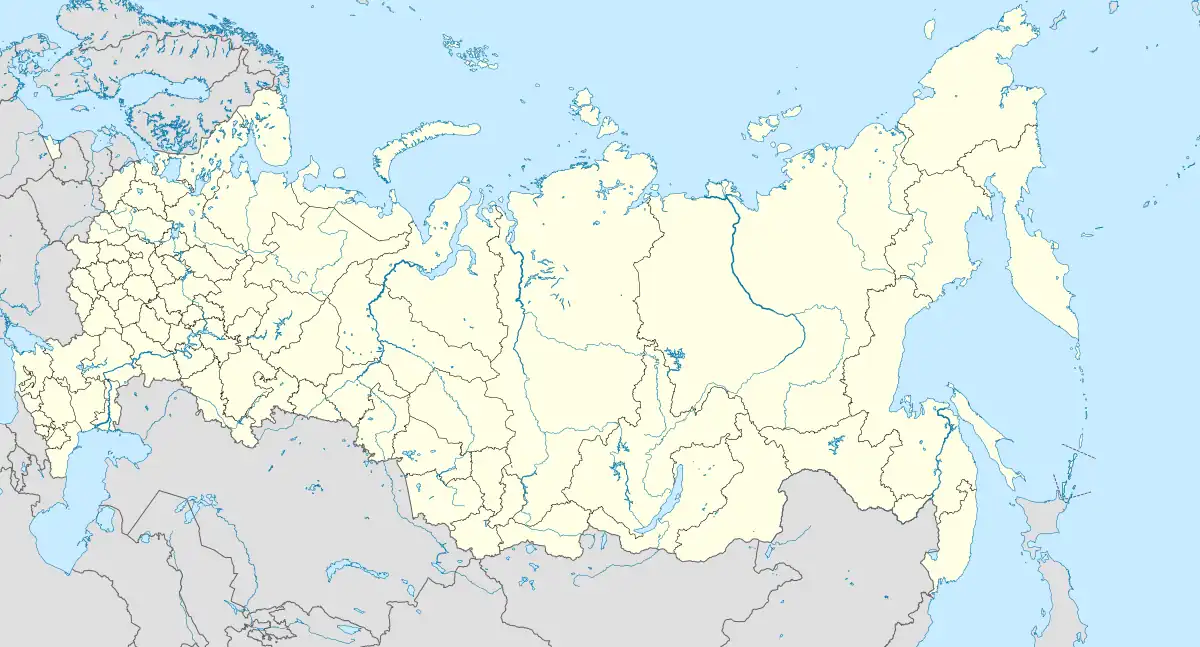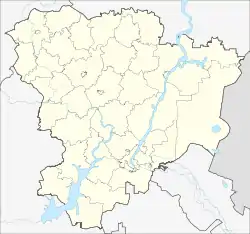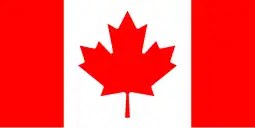Volgograd
Volgograd, formerly called Tsaritsyn (1589–1925) and Stalingrad (1925–1961) is an industrial city of great importance, and the administrative center of Volgograd Oblast, Russia. It is 80 km long, north to south, on the western bank of the Volga River and has a population of over 1.011 million people. The city was made famous for its heroic resistance and bloody siege during the Battle of Stalingrad taking place during World War II.
Volgograd
Волгоград | |
|---|---|
City[1] | |
 Counterclockwise: The Motherland Calls, the railway station, Planetarium, The Metrotram, Panorama of the City, Gerhardt Mill, Mamayev Kurgan | |
 Flag  Coat of arms | |
| Anthem: none[2] | |
Location of Volgograd | |
 Volgograd Location of Volgograd  Volgograd Volgograd (Volgograd Oblast) | |
| Coordinates: 48°42′N 44°31′E | |
| Country | Russia |
| Federal subject | Volgograd Oblast |
| Founded | 1589[3] |
| City status since | the end of the 18th century[1] |
| Government | |
| • Body | City Duma[4] |
| • Head[4] | Alexander Chunakov |
| Area | |
| • Total | 859 km2 (332 sq mi) |
| Elevation | 80 m (260 ft) |
| Population | |
| • Total | 1,021,215 |
| • Estimate (2018)[6] | 1,013,533 (−0.8%) |
| • Rank | 12th in 2010 |
| • Density | 1,200/km2 (3,100/sq mi) |
Administrative status | |
| • Subordinated to | city of oblast significance of Volgograd |
| • Capital of | Volgograd Oblast, city of oblast significance of Volgograd |
Municipal status | |
| • Urban okrug | Volgograd Urban Okrug |
| • Capital of | Volgograd Urban Okrug |
| Time zone | UTC+3 (MSK |
| Postal code(s)[8] | 400000–400002, 400005–400012, 400015–400017, 400019–400023, 400026, 400029, 400031–400034, 400036, 400038–400040, 400042, 400046, 400048–400055, 400057–400059, 400062–400067, 400069, 400071–400076, 400078–400082, 400084, 400086–400089, 400093, 400094, 400096–400098, 400105, 400107, 400108, 400110–400112, 400117, 400119–400125, 400127, 400131, 400136–400138, 400700, 400880, 400890, 400899, 400921–400942, 400960–400965, 400967, 400970–400979, 400990–400993 |
| Dialing code(s) | +7 8442 |
| OKTMO ID | 18701000001 |
| City Day | Second Sunday of September[1] |
| Twin towns | Coventry, Ostrava, Kemi, Liège, Dijon, Turin, Port Said, Chennai, Hiroshima, Reinickendorf, Chemnitz, Ruse, Jilin City, Kruševac, Tiraspol, Płońsk, Sandanski, Orlando, Olevano Romano, Cleveland, Toronto, Chengdu, Yerevan, İzmir, Ortona, Cologne, Constanța, Qujing, Kyiv |
| Website | www |
History
_(1857).png.webp)
Volgograd developed from the fortress of Tsaritsyn in 1589. The fortress was at the meof the Tsaritsa and Volga Rivers. During the Russian Civil War the city was the scene of heavy fighting. Bolshevik forces occupied it during 1918, but were attacked by White forces. It was renamed as Stalingrad in 1925.
Under Stalin, the city became heavily industrialized as a centre of heavy industry and trans-shipment by rail and river. During World War II, Stalingrad became the center of the Battle of Stalingrad as well as a turning point in the war against Germany. Essentially, the German offensive was stopped at Stalingrad. The Battle of Stalingrad lasted from August 21, 1942 to February 2, 1943, where 1.7 million to 2 million Axis and Soviet soldiers were killed, wounded or captured, in addition to over 40,000 civilians killed. The city was reduced to rubble during the fierce fighting, but reconstruction began soon after the Germans were expelled from the city.
Nikita Khrushchev renamed the city because of de-Stalinization in 1961.
International relations
Twin towns — Sister cities
As of 2008, Volgograd has 21 sister cities:[9]
.svg.png.webp) Coventry, England, United Kingdom (1943)
Coventry, England, United Kingdom (1943) Ostrava, Czech Republic (1948)
Ostrava, Czech Republic (1948) Kemi, Finland (1953)
Kemi, Finland (1953).svg.png.webp) Liège, Belgium (1959)
Liège, Belgium (1959) Dijon, France (1959)
Dijon, France (1959) Turin, Italy (1961)
Turin, Italy (1961) Port Said, Egypt (1962)
Port Said, Egypt (1962) Chennai, India (1966)
Chennai, India (1966) Hiroshima, Japan (1972)[10]
Hiroshima, Japan (1972)[10] Cologne, Germany (1988)
Cologne, Germany (1988) Chemnitz, Germany (1988)
Chemnitz, Germany (1988) Cleveland, Ohio, United States (1990)
Cleveland, Ohio, United States (1990) Toronto, Canada (1991)
Toronto, Canada (1991) Jilin, China (1994)
Jilin, China (1994) Yerevan, Armenia (1998)
Yerevan, Armenia (1998) Chengdu, China (1998)
Chengdu, China (1998) Kruševac, Serbia (1999)
Kruševac, Serbia (1999) Ruse, Bulgaria (2001)[11]
Ruse, Bulgaria (2001)[11] Huntingdon, Pennsylvania, United States (2003)
Huntingdon, Pennsylvania, United States (2003) Orlando, Florida, United States (2008)
Orlando, Florida, United States (2008) Baku, Azerbaijan (2008) [12]
Baku, Azerbaijan (2008) [12]
A number of communities in France and Italy have streets or avenues named after Stalingrad, hence Place de Stalingrad in Paris and the Paris Métro station of Stalingrad.
Gallery
 Volgograd from Space
Volgograd from Space Map of Volgograd's City Districts
Map of Volgograd's City Districts Underground station of Volgograd metrotram — Lenin's Square
Underground station of Volgograd metrotram — Lenin's Square Volgograd State Medical University (left) and New Experimental Theater of Volgograd
Volgograd State Medical University (left) and New Experimental Theater of Volgograd
References
- Charter of Volgograd, Preamble
- Official website of Volgograd. Конкурс на создание гимна Волгограда будет проведен повторно (in Russian)
- Энциклопедия Города России. Moscow: Большая Российская Энциклопедия. 2003. pp. 81–83. ISBN 5-7107-7399-9.
- Charter of Volgograd, Article 22
- Всероссийская перепись населения 2010 года. Том 1 [2010 All-Russian Population Census, vol. 1]. Всероссийская перепись населения 2010 года (2010 All-Russia Population Census) (in Russian). Federal State Statistics Service. 2011. Retrieved June 29, 2012.
- "26. Численность постоянного населения Российской Федерации по муниципальным образованиям на 1 января 2018 года". Federal State Statistics Service. Retrieved 23 January 2019.
- "Об исчислении времени". Официальный интернет-портал правовой информации (in Russian). 3 June 2011. Retrieved 19 January 2019.
- Почта России. Информационно-вычислительный центр ОАСУ РПО. (Russian Post). Поиск объектов почтовой связи (Postal Objects Search) (in Russian)
- Friendly relationship at Official website of Volgograd
- "広島市の姉妹・友好都市". City.hiroshima.jp. Archived from the original on 2009-06-07. Retrieved 2009-07-17.
- "Ruse Municipality - Fraternize Cities". © 2008-2009. Retrieved 2009-07-06.
- Executive power of Baku city
Other websites
- Official website of Volgograd (in English)
- (in Russian) Official website of Volgograd
- (in Russian) Volgograd.ru — City Web Portal, Local Business and Web Directory, News, Press, Webcams, 3D Mamayev Kurgan Archived 2020-12-08 at the Wayback Machine
- Over 2,000 original German WWII soldier photographs from the Eastern Front Archived 2007-12-13 at the Wayback Machine
- Sights of Volgograd Archived 2015-09-24 at the Wayback Machine
- Photo Gallery from Volgograd Archived 2008-12-21 at the Wayback Machine
- Stalingrad - Bilder einer erbitterten Schlacht (German)